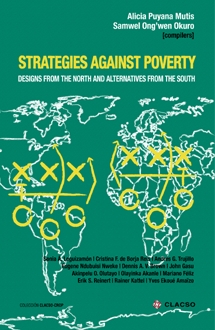Strategies Against Poverty: Designs from the North and alternatives from the South

PUBLICATION: Alicia Puyana Mutis & Samwel Ong´wen Okuro [Editors], CLACSO-CROP Series. CLACSO, Buenos Aires, Junio de 2011
The book, edited by Alicia Puyana Mutis and Samwel Ong´wen Okuro and published by Colección CLACSO-CROP, presents the contributions of African and Latin American experts on economic development to the seminar Strategies against poverty: Designs from the North and Alternatives from the South organized by the Conferencia Latinoamericana de Ciencias Sociales, CLACSO, CROP and the South-South Exchange Programme for Research on the History of development, SEPHIS.
The purpose of the seminar was to open space for debate, from a historical perspective, alternative theoretical approaches on the causes of poverty and to explore the, sometimes diverging, strategies to its eradication as proposed by the North, donors and multilateral organizations, and by the South, governments and non-governmental organizations.
The particular interest in studying poverty in the context of developing countries, often called the South, is to show the profound socio-economic inequalities existing in these countries and the problems that result when the programs structured to mitigate poverty are, in too many cases, a mere incorporation to local scenarios of the "universal policies, from international and funding agencies.
These programs made with the idea that one size fits all, ignore the needs, priorities and realities of individual countries and regions and only meet the North's neoliberal paradigms. There is no need to stress the relevance of comparative analysis of the effects of colonial and neo-colonial powers to understand the factors constraining economic growth in developing countries.
INDEX
Introduction. Looking Proper Answers in African, Latin American and Caribbean Countries | 13
Samwel Ong’wen Okuro and Alicia Puyana Mutis
First Part. Theoretical Alternatives for a Comprehensive Analysis of Anti-Poverty Strategies
1.1. Neoliberal and Neo-Colonial Governmentality: Social Policies and Strategies against Poverty from the North and Alternatives from the South “The Case of South America and the Caribbean” | 41
Sonia Álvarez Leguizamón
1.2. Public Investment for Economic Development and Poverty Reduction: Theoretical and Empirical Analysis | 75
Cristina Fróes de Borja Reis
1.3. Economic Growth, Employment and Poverty Reduction: A Comparative Analysis of Chile and Mexico with References to Argentina, Brazil and Colombia | 105
Alicia Puyana Mutis
Second Part. Poverty Diagnosis from “the South”
2.1. Social Policy in the Neoliberal Order: Conditional Cash Transfer Programmes as Mechanisms of Political Legitimacy in Latin America | 137
Andrés García Trujillo
2.2. Ownership Question and Poverty Reduction Strategy in Nigeria: What Has Gone Wrong? | 161
Eugene Ndubuisi Nweke
Third Part. Proposals to Alternative Policy Designs for Poverty Eradication
3.1. Structural Adjustment and the Neglect of Intergenerational Poverty in the Caribbean | 189
Dennis A. V. Brown
3.2. Poverty Reduction in Ghana: Alternative Solutions by the State | 219
John Gasu
3.3. Fighting the “Poverty War”: Non- Governmental Organisations and the Challenge of Poverty Eradication in Nigeria | 245
Akinpelu O. Olutayo and Olayinka Akanle
3.4. Rethinking World Bank Driven Land Tenure Reforms in Kenya | 273
Samwel Ong’wen Okuro
3.5. The Macroeconomic Limits of Income’s Policy in a Dependent Country: The Need and Possibilities for Radical Reforms in Social Policies in Argentina after the Crisis (2001-2008) | 301
Mariano Féliz
3.6. State Failure, Poverty and Productive Structure | 325
Erik S. Reinert, Rainer Kattel and Yves Ekoué Amaïzo







